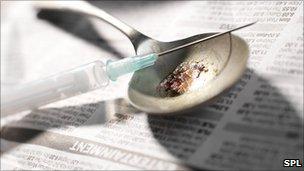Drug addict benefit withdrawal considered
- Published

Some say withdrawing benefits from drug users would lead them into crime
People dependent on drugs and alcohol who refuse treatment could have their welfare benefits withdrawn under plans being considered by the Home Office.
The idea is in a consultation paper on the government's drug strategy for England, Wales and Scotland.
The proposals also suggest that addicts on benefits should not be required to seek work while receiving treatment.
Some experts have suggested that withdrawing benefits could lead addicts into crime and prostitution.
The Labour government intended to carry out pilot schemes this year to get drug users into work.
Under the plans, addicts who failed to attend a treatment awareness programme would lose welfare benefits.
However, in May the Social Security Advisory Committee - an independent statutory body - said withdrawing benefits from drug users would lead them into crime and prostitution.
The coalition government scrapped the pilot programme - but the Home Office has now revived the idea.
It asks for views on whether there should be some form of "financial benefit sanction" for claimants who do not take action to address their drug or alcohol dependency.
Martin Barnes, chief executive of charity DrugScope, said he "seriously questioned" whether linking benefit sanctions to a requirement to undergo medical treatment was fair and effective.
He told the ДѓЯѓДЋУН's Radio 4's Today programme there was no evidence that such an approach would for work for a "particularly vulnerable and marginalised group".
"Also, we have to bear in mind that under the principles that are enshrined in the NHS Constitution, medical intervention should be therapeutic, consensual, confidential - and I just don't see that's compatible with using the benefits system to require people to undergo a complex form of drug treatment intervention," he added.
'Mistake'
Drugscope's Martin Barnes: "Benefits can have a very important role in helping people with drug and alcohol problems"
Simon Antrobus, chief executive of Addaction, said getting more people into drug treatment was "always a good thing, but attempting to force them into that process by taking away their benefits would be a mistake".
"The people Addaction help will tell you how coming off drugs is extremely difficult, and how deciding to access treatment took them a very long time.
"Remove financial stability during that time, and you can severely damage someone's chances of beating an addiction. More likely, you could increase their chances of turning to crime to find an alternative income," he said.
One 37-year-old former alcohol addict, who did not want to be named, said cutting state benefits would not have any effect on serious addicts.
"If people are addicted to substances then they will go to any length to get hold of them. Taking some money away isn't going to make the difference - benefit isn't enough to sustain a habit anyway," he said.
"Addiction doesn't just affect the unemployed, this is a wider social issue being tackled in a typically narrow-minded manner," he added.
But former drugs and alcohol addict, Jeff Groves, 39, from Hayes, said if he had faced having his benefit money cut, it would have forced him to address his addiction earlier.
"It's good to force people into treatment, in order to show drug addicts that there is another way," he said.
A Home Office spokesperson said the government would "carefully consider" responses, but it was "determined to prevent drug use and strengthen enforcement against supply".
"That's why we are asking experts for their views on a range of issues including whether we should strengthen the link between benefits, and drug and alcohol use, so that users are strongly encouraged to address their dependency," he said.
The Home Office has also confirmed plans to give ministers the power to ban new substances for a year until they have been properly assessed in a bid to combat so-called "legal highs".
Minister for Crime Prevention James Brokenshire said: "The drugs market is changing and we need to adapt current laws to allow us to act more quickly.
"The temporary ban allows us to act straight away to stop new substances gaining a foothold in the market and help us tackle unscrupulous drug dealers trying to get round the law by peddling dangerous chemicals to young people."
- Published28 May 2010